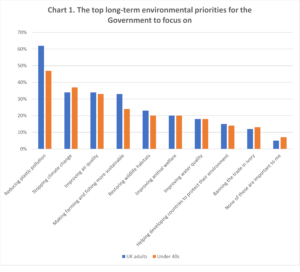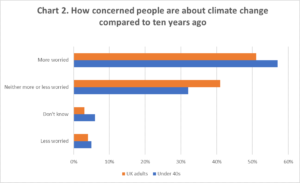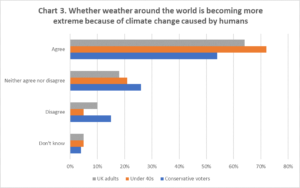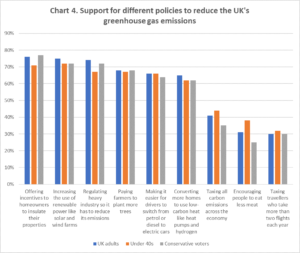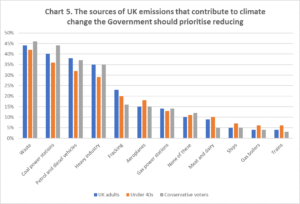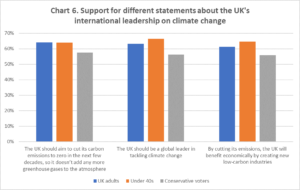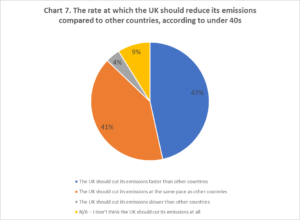
In recent months, the Government has made the environment a major focus of its domestic policy programme. In January 2018, the Prime Minister, Theresa May, gave the first domestic prime ministerial speech on the environment in 14 years, as she launched the Government’s 25-year environment plan.
Although the majority of the new government policy announcements on the environment have related to plastic pollution and animal welfare, there have been several new policies on climate change. The Government has recently launched the Clean Growth Strategy for meeting the fourth and fifth carbon budgets, established the Powering Past Coal alliance with Canada to end the use of unabated coal power, and announced £140 million of new aid spending to help poorer countries that are affected by climate change.
This new political focus on the environment was partly informed by previous Bright Blue polling on the attitudes of younger voters, a group of voters among whom the Conservative Party performed poorly at the last election and to whom they need to appeal in order to regain their parliamentary majority. Our research, published in September 2017, found that climate change is the top issue 18-28 year olds want to hear senior politicians discuss more and the second top issue for under 40s after health. It also found that 83% of under 40s would be proud of voting for a party that adopted the policy of generating more electricity from renewables like wind and solar, the most popular of the nine policies we tested that are commonly associated with younger voters. Previous Bright Blue research found that most Conservative voters are concerned about the impacts of climate change and support various policies to address it.
The aim of this new polling analysis is to better understand public attitudes to climate change, ten years since the UK’s world-leading Climate Change Act 2008 was passed, in order to assess the appropriateness of the UK’s current climate change targets and to inform future policymaking about climate change. This analysis will feed in to Bright Blue’s forthcoming research report on strengthening the Climate Change Act. Our previous research into the political attitudes of younger voters unearthed the salience of climate change relative to other issues that are commonly associated with younger voters. In particular, this research will analyse the attitudes of younger voters towards action on climate change in greater detail.
Methodology
Polling was undertaken by Opinium through online interviews and conducted between 28th February and 5th March, 2018. It consisted of one large nationally representative sample of 4,007 UK adults. From this overall sample, we also produced two subsets, each individually weighted. The first was a sample of 1,422 British adults who were Conservative voters in the 2017 General Election. The second was a sample of 1,508 UK adults aged under 40. Each data set (the overall sample and the two subsets) was individually weighted in terms of age, gender, and region to reflect a nationally representative audience. These data sets enabled us to achieve two goals.
First, we were able to quantify public attitudes towards climate change, particularly those of Conservative voters at the 2017 General Election (whom we will refer to as ‘Conservative voters’) and of UK adults under 40. Polling also enabled us to reveal their views on various statements of UK leadership and policies on climate change. We chose to focus on Conservative voters, as the current Government, on whose votes they rely, are unlikely to enact climate change policies that are unpopular with their supporters. We chose to focus on UK adults under 40 in particular, as the Conservative Party performed badly among this demographic at the last General Election and is interested in new policies that can increase their appeal with younger voters.
Second, our polling allowed us to analyse the views of UK adults, Conservative voters, and under 40s according to other socio-demographic characteristics including gender, age, socio-economic grade, EU Referendum vote, and others. This helped to reveal any underlying diversity of opinion within Conservative voters and under 40s.
Concern about climate change
In general, tackling climate change was a high environmental priority, while people are more concerned about it than they were ten years ago.
When ranking different long-term environment priorities for the Government to focus on, UK adults put climate change second to plastic waste and level with air quality. As Chart 1 illustrates, 34% of UK adults put stopping climate change among their top three environmental priorities. The high position of plastic waste is likely to be linked to the significant recent media and government focus on the issue, especially in BBC’s Blue Planet Two. Among under 40s, climate change is the second most popular priority, with 37% putting it in their top three – a slightly higher proportion than the general population. Notably, just 20% of UK adults (and the same proportion of under 40s) put animal welfare in their top three, despite the recent spate of government announcements on the issue.
A small majority of UK adults (51%) are either a lot more or a little more concerned (we will refer to these groups together as ‘more worried’) about climate change than they were ten years ago when the Climate Change Act 2008 was passed, as shown by Chart 2. Just 4% are either a lot less or a little less worried (overall ‘less worried’). Among under 40s, a slightly larger majority (57%) are more concerned about climate change than they were ten years ago.
Impacts of climate change
Most people believe weather is becoming more extreme as a result of climate change, while one of the most salient impacts of climate change, both domestically and internationally, is the potential harm to nature.
As illustrated by Chart 3, nearly two-thirds of UK adults (64%) agree that weather around the world is becoming more extreme because of climate change caused by humans. A higher proportion (72%) of under 40s agree. A slightly smaller majority of Conservative voters (54%) also agree.
We also tested public attitudes to different impacts of climate change.
In terms of domestic impacts of climate change, the top three impacts that UK adults want senior politicians to talk more about are: damage to homes from more flooding and stronger storms (35% put in their top three); loss of wildlife due to changing seasons and weather patterns (34%); and higher food prices from a lack of water and worse soil quality (34%). The impact the public are least interested in senior politicians talking more about is health effects, such as heatstroke, from more very hot days, which just 13% put in their top three. Interestingly, concern about health effects is highest in London, where 20% put it in their top three.
Among under 40s, the top three impacts they want to senior politicians to talk more about are: higher food prices from a lack of water and worse soil quality (35%); loss of wildlife due to changing seasons and weather patterns (33%); and damage to homes from more flooding and stronger storms (26%). Among Conservative voters, the top three domestic impacts they want to senior politicians to talk more about are: damage to homes from more flooding and stronger storms (37%); new diseases and invasive species from warmer temperatures (33%); and loss of wildlife due to changing seasons and weather patterns (31%).
Although many of the top three impacts are common to the three different groups, it is striking that, among under 40s, damage to homes is chosen by a smaller proportion than both the general population and Conservative voters. This might reflect the lower rates of homeownership among under 40s.
In terms of international climate change impacts, UK adults want senior politicians to talk more about the loss of natural environments like coral reefs and rainforests (44%), the loss of world wildlife like polar bears (35%), and food shortages from more extreme weather destroying crops (34%). Conservative voters and under 40s have the same top three impacts occurring in the same order.
It is interesting to note the salience of the nature-related impacts of climate change in both the domestic and international questions in the survey. This impact has been a significant focus of the recent popular BBC programme Blue Planet Two, which could have helped to increase people’s awareness.
Public priorities for decarbonisation
There is strong public support for several policies to reduce greenhouse gas emissions in the UK. We tested nine different climate change policies, which we chose as they are all commonly proposed (in some cases by Bright Blue) and easily understood approaches to tackling climate change. As Chart 4 depicts, the following six policies are supported by around two-thirds of UK adults or more: offering incentives to homeowners to insulate their properties (76% support this); increasing the use of renewable power like solar and wind farms (75%); regulating heavy industry so it has to reduce its emissions (74%); paying farmers to plant more trees (68%); making it easier for drivers to switch from petrol or diesel to electric cars (66%); and converting more homes to use low-carbon heat like heat pumps and hydrogen (65%).
The three least popular policies are: taxing all carbon emissions across the economy (41% support this); encouraging people to eat less meat (only 31% support this); and taxing travellers who take more than two flights each year (30%).
It is particularly interesting that, among Conservative voters, 72% support increasing the use of renewable power like solar and wind farms – the same proportion of under 40s who support it. Among Conservative voters who live in rural areas, support is similarly high (69%). Given the previously common assumption that renewable energy – particularly onshore wind – is unpopular among the Conservative Party’s rural voter base, this is a noteworthy finding.
Offering incentives for home insulation, which Bright Blue recommended in our report Better homes, is a very popular policy among Conservative voters, with 77% in support. There is similarly strong support among both Leave-voting Conservative voters (76%) and Remain-voting Conservative voters (80%).
Overall, these findings are somewhat unsurprising given the intuitive attraction to someone of benefiting from incentives over paying new taxes. However, one lesson for policymakers could be the importance of framing climate policies in terms of incentivising the adoption of new clean technologies that enable existing lifestyles to be maintained, rather than ‘penalising’ the use of existing carbon-intensive technologies.
The polling also found that people broadly share the Government’s recent priorities for tackling sources of greenhouse gas emissions. As demonstrated in Chart 5, the top four sources of emissions that UK adults think government should prioritise reducing are: waste (44% put in their top three); coal power stations (40%); petrol and diesel vehicles (38%); and heavy industry (35%). To date, the power sector, waste, and industry have seen the biggest falls in emissions, while the Government has introduced several new policies to stimulate the adoption of electric vehicles in the transport sector.
The three least popular sources of emissions for the Government to prioritise reducing are: ships (just 5% put in their top three); gas boilers (4%); and trains (4%). There is not much variation in the results for under 40s and Conservative voters.
The UK’s international leadership on tackling climate change
Most people support the UK demonstrating international leadership on tackling climate and see economic benefits from doing so.
As Chart 6 shows, 63% of UK adults agree that the UK should be a global leader in tackling climate change (66% of under 40s agree and 56% of Conservative voters); 64% agree the UK should aim to cut its carbon emissions to zero in the next few decades, so it doesn’t add any more greenhouse gases to the atmosphere (64% of under 40s agree and 58% of Conservative voters); and 61% agree that, by cutting its emissions, the UK will benefit economically by creating new low-carbon industries (65% of under 40s agree and 56% of Conservative voters).
Interestingly, our polling found that majorities of both Leave (57%) and Remain (74%) voters support the UK cutting its carbon emissions to zero in the next few decades. Similarly, majorities of both Leave (54%) and Remain (74%) voters agree that the UK should be a global climate leader. More ambitious climate change targets, therefore, are popular with both sides of the EU Referendum debate, but are particularly popular with Remain voters, as well as younger voters.
We also asked respondents how quickly the UK should cut its emissions relative to other countries. A large majority of UK adults (90%) believe the UK should cut its emissions at least as quickly as other countries. In fact, 38% say the UK should cut its emissions faster than other countries. Among Conservative voters, 91% believe the UK should cut its emissions at least as quickly as other countries, with 30% saying they should cut them faster than other countries. As seen in Chart 7, UK climate leadership is particularly popular among the under 40s, with nearly half (47%) saying that the UK should cut its emissions faster than other countries, which is the most common answer.
Conclusion
This polling analysis has shown that there is strong and growing public concern about climate change and a belief that it is causing more extreme weather around the world. We have found support for tackling greenhouse gas emissions from a range of sectors and sources, although there is scepticism about reducing emissions in the aviation and agricultural sectors through measures to reduce demand for polluting behaviours.
Crucially, the polling also revealed that there was significant support for the UK leading internationally on tackling climate change, for cutting its emissions to zero, and for capturing the economic benefits of more ambitious decarbonisation. Therefore, should the UK Government enshrine in law the Paris Agreement pledge to reduce its greenhouse gas emissions effectively to zero before the end of this century, it would have the backing of the majority of the UK public.
In general, we found that younger people tend to be more supportive of greater ambition on tackling climate change than the general population, as are Remain voters. Conservative voters tend to be marginally less supportive of tackling climate change than the general population, although there is still support among a majority of Conservative voters for more ambitious action on climate change. The Government could appeal to younger voters through more ambitious climate policies without trading off existing voters.
Sam Hall is Head of Research at Bright Blue
Notes
- The full data tables for the general population can be found here, for the under 40s can be found here, and for Conservative voters can be found here
- We gratefully acknowledge the support of the European Climate Foundation for this project
- We are grateful to Opinium for advising on and carrying out the survey, and for their comments on our analysis

Assuming the federal government’s ambitious timetable is met, on 1st July 2018, Canada will become the first G7 country to have legalised the production, sale, use, and possession of recreational cannabis. They will be only the second country in the world after Uruguay to fully legalise cannabis.
If implemented well, this is a major opportunity for Canada to improve its public health outcomes, reduce young people’s contact with criminals and the justice system, cut the influence and funding of organised crime, and benefit their public finances with additional tax revenue and lower enforcement costs.
Crucially, Canada also has an opportunity to demonstrate to the international community how a regulated cannabis market can work and, through its federalised system, to test the benefits and disadvantages of different approaches to regulation.
Canada’s move fits within a wider, global context of cannabis decriminalisation and medical cannabis legalisation. In the US, eight states have now licensed, or are in the process of licensing, the sale of recreational cannabis.
Canada’s case, however, is different. First, legalisation did not come about through direct democracy (i.e. a referendum) as in American states, but rather as a result of the Liberal Party enacting an election pledge following its victory in October 2015. Second, Canada’s legalisation has been effected through a federal rather than a provincial law, although there will be significant variation among the provinces over how it is implemented.
Some of the issues that have been devolved to provinces to decide are: how much tax to levy; where people will be allowed to smoke; the types of outlets that will be allowed to sell it; how those outlets will get their supply; and whether to increase the minimum age limit from 18.
The merits of the Canadians’ federalist approach are mixed. There is a danger that poor decisions at province-level about regulation and tax could undermine the central aims of the legalisation. If provinces decide on very high retail taxes, for instance, then there may be a big enough price advantage to enable the black market to flourish.
Another danger, which seems fairly likely at the moment, is that reluctant provinces fail to make sufficiently quick progress on implementing the new law. As of early November 2017, just three of the ten provinces (Alberta, Ontario, and New Brunswick) have made proposals for how they will regulate their retail cannabis market, with some issuing calls for the legalisation date to be delayed to 2019.
But, more positively, the federalist model enables Canada to test and pioneer different approaches to cannabis regulation. And as provinces debate how to regulate cannabis, policymakers have to decide how to trade off two critical factors.
The first is eliminating the criminal market for cannabis. This is important in order to sever a major funding source of organised crime and to reduce the exposure of young users to criminal elements. This factor favours making the legal product sufficiently accessible, so it is convenient to buy from retail outlets and those aged 18 and over are able to purchase it, and also sufficiently affordable, with relatively low tax rates, to limit the demand for cheaper, illicit cannabis.
Cracking down on black market demand entails encouraging legitimate private enterprises to enter the market and become established, while enabling their investors to see some kind of return on their capital. Although it is widely expected that existing medical marijuana producers will expand to enter the new recreational market, these incumbents are downplaying their ability to meet all the potential legal demand.
The second factor relates to reducing the overall prevalence of cannabis use, in order to protect public health from what can be a harmful product, particularly for younger smokers. This favours higher sales taxes, higher minimum age limits, stringent licensing of retail outlets, strict advertising and marketing restrictions, and so on.
The new production, distribution, and retail businesses will need to be regulated carefully, in order to limit excessive commercialisation, which could potentially damage public health.
When navigating this trade-off, however, it is important that Canadian policymakers do not elide harm reduction and demand reduction. A harm reduction approach necessarily accepts that there will be demand for cannabis regardless of the law, while ensuring that this demand is met in the safest way possible.
The signs are that the federal government is handling this well: in regulating the advertising of cannabis like cigarettes, but setting a minimum age limit of 18 years old, they have chosen a pragmatic centre-ground.
The chances of Canada’s approach crossing the Atlantic to the UK look slim at the moment. The UK Government remains firmly opposed to any kind of drugs liberalisation. This summer, the Home Office released its first “Drugs strategy” since 2010, which stated: “We have no intention of decriminalising drugs. Drugs are illegal because scientific and medical analysis has shown they are harmful to human health.”
At the last general election, both the main parties, the Conservatives and Labour, committed to maintaining the current prohibition. The Liberal Democrats, however, did propose creating a regulated cannabis market, although focus group research suggests that the policy turned off swing voters in marginal constituencies because it was not perceived as credible.
Like Canada, it seems likely that cannabis will ultimately be legalised in the UK by a party implementing a general election manifesto pledge. While we do obviously have referendums in the UK, they are usually reserved for constitutional questions, rather than for social policy.
The balance of British public opinion remains against legalising cannabis, although this could change over time, as polling that Bright Blue has commissioned shows that younger voters are more likely to support legalisation than their older counterparts. Forty-five percent of 18-28 year olds would be proud to vote for a party that legalised and regulated cannabis, against 31% who would be embarrassed. Among the general population, only 36% would be proud, compared to 39% who would be embarrassed.
By comparison, polling in Canada was stronger prior to Trudeau’s election victory than it is now in the UK. One poll from August 2015 shows a small majority (53%) were in favour of cannabis legalisation. It was undoubtedly an advantage that Canada has relatively high prevalence of cannabis use among its general population of around 12%, while in the UK, the figure is lower, at around 6.5% according to government figures. It also helped that medical cannabis has also been legal in Canada since 2013, which was a precursor to full legalisation in many of the US states too.
Perhaps in a future election, cannabis legalisation could form part of a liberal, progressive manifesto that targets the votes of young British people. Moreover, Trudeau has shown that election victory can itself cause a favourable shift in public attitudes towards the issue. Very few mainstream political voices in Canada are now actively advocating to reverse the decision, concentrating instead of getting restrictive regulation.
It may be that trailblazing countries like Canada can provide clear evidence to UK policymakers of how having a regulated, legal cannabis market leads to reduced harm. But mainstream debate in the UK seems quite distant to where it was in Canada prior to the Liberals’ victory.
Sam Hall is a senior research fellow at Bright Blue
The Chancellor needs some bold announcements on housing in the Budget. This is a political and economic imperative. Together with policy issues like climate change and health, policies on housing should be central to the Conservative Party’s efforts to win over the younger voters they need to regain their parliamentary majority. According to Bright Blue research, among 25-49 year olds, housing is seen as the second most underdiscussed issue by senior politicians.
https://reaction.life/hammond-must-think-big-housing/Climate change is the top issue for 18 to 28 year olds. Recent polling, commissioned by Bright Blue, of younger voters reinforces the popularity of climate policies with this demographic.
https://www.conservativehome.com/thinktankcentral/2017/11/sam-hall-environmental-policy-can-help-conservatives-win-over-younger-voters.htmlThe renewed conservative interest in environmental issues is politically timely. At the last general election, Labour consistently outperformed the Conservatives among voters aged under 47. Conservatives urgently need new policies that appeal to this crucial demographic and reverse this trend.
https://www.conservativehome.com/thinktankcentral/2017/11/sam-hall-environmental-policy-can-help-conservatives-win-over-younger-voters.html
The Conservative Party has a problem with younger voters. At the last general election, the young decisively opted for Jeremy Corbyn’s Labour Party over Theresa May’s Conservatives. In their post-election study, YouGov found that age was in fact the best socio-demographic predictor of voting intention: the younger you were, the more likely you were to vote Labour. It wasn’t until the age of 47 that voters became more likely to back the Conservatives over Labour, implying the problem is deeper than just students who might have been persuaded by Corbyn’s high-profile pledge to abolish tuition fees.
In the aftermath of the election, conservative opinion formers and politicians have spilled considerable quantities of ink proposing new ways of engaging with these younger voters that rejected the party in such large numbers. One of the most high-profile interventions was a speech to Bright Blue’s social reform conference by First Secretary of State, the Rt Hon Damian Green MP, who claimed housing, devolution to cities, and industrial strategy are key policy priorities for young people.
Ahead of the 2017 Conservative Party Conference, Bright Blue commissioned YouGov to conduct polling to provide evidence of what the political priorities are of younger voters under the age of 40, what they think of the Conservative Party’s policies, which policies would make them feel proud of voting for a political party, and how socially liberal they are.
This polling is intended to help inform the concrete change in policies and focus that could win over younger generations.
Methodology
YouGov conducted an online survey between 11th September 2017 and 13th September 2017 of 3,326 British adults. They used the latest Office for National Statistics (ONS) data to ensure the sample was fully representative of the British adult population according to age, gender, socio-economic grade, and government region. This included a sample of 1,092 British adults under the age of 40.
The survey included standard socio-demographic cross-breaks of age, gender, government region, socio-economic grade, vote in the 2016 EU referendum, and vote in the 2017 General Election. This enabled us to compare the views of the under 40s with the general population. It also enabled us to analyse the views of the under 40s according to different socio-demographic characteristics.
As additional cross-breaks, we used three indicators of social liberalism: support for same-sex marriage; opposition to a significant reduction in the levels of immigration; and opposition to the reintroduction of capital punishment for murder. We chose these specific indicators as they are often viewed as totemic liberal viewpoints. We wanted to gauge just how socially liberal younger voters were and to see whether social liberalism affected their view of particular policies.
We asked respondents to choose up to three policy issues which they think politicians do not discuss enough and want to see discussed more often. In the list, we included a mixture of commonly discussed policy issues and less frequently discussed ones. As Chart 1 shows, the top three policy issues that under 40s feel senior politicians do not discuss enough and want to see them discuss more are: health (28% put in their top three); climate change (26% put in their top three); and education (25% put in their top three). It is particularly striking to see climate change feature so highly, ahead even of housing which comes fourth. Climate change performs even better among 18- to 24-year-olds, for whom it is the top issue they want politicians to discuss more, with 30% putting it in their top three.
Chart 1. The top three policy issues voters feel senior politicians do not discuss enough and want to see them discuss more, according to age
Compared to the general population, under 40s are less likely to want to see senior politicians discuss policy issues like immigration (only 18% of the under 40s put it in their top three, compared to 29% of the general population), crime (16% of the under 40s, compared to 19% of the general population), Brexit (13% of the under 40s, compared to 16% of the general population), and welfare (11% of the under 40s, compared to 15% of the general population).
Interestingly, there is not huge appetite among under 40s to hear more of the policy issues that are commonly thought to appeal to younger voters, such as cannabis legalisation (which 12% pick among their top three), animal welfare (10%), internet privacy (10%), Lesbian, Gay, Bisexual, and Transgender (LGBT) rights (8%), and international development (3%). There is, however, significantly more interest in having more discussion of these issues by senior politicians among under 40s than the general population. In fact, some of these policy issues fare slightly better among the youngest demographic of 18- to 24-year-olds: internet privacy (13% of 18- to 24-year-olds put it in their top three), cannabis legalisation (14%), and LGBT rights (13%).
Perception of Conservative Party policies on key policy issues
We asked respondents to select up to three adjectives that best describes their perception of the Conservative Party’s policies on different policy issues that are important for or associated with younger voters. The available adjectives were: ‘inadequate’, ‘weak’, ‘damaging’, ‘safe’, ‘idealistic’, ‘pragmatic’, ‘risky’, ‘ambitious’, ‘beneficial’, ‘strong’, and ‘other’. There was also a ‘don’t know’ option.
We chose to test seven specific policy issues. Some of these policy issues are of great concern to younger voters, as Chart 1 showed, especially climate change and education. In some cases, these issues are typically associated with young people in political commentary, such as the private rented sectorand cannabis legalisation. In other cases, previous polling evidence suggests younger voters are more concerned about them, such as LGBT rights and animal welfare.
When testing the perception of the under 40s of Conservative Party policies in these key policy issues, the most popular answer in every instance is ‘don’t know’. This suggests there is low awareness of the Conservative Party’s policies among under 40s.
When under 40s do choose an adjective to describe Conservative Party policies on key policy issues, negative ones score highest, as shown in Table 1. The adjectives that received the highest scores are: 21% of under 40s think Conservative climate change policies are ‘weak’; 18% think their internet privacy policies are ‘damaging’; and 16% think their private rented sector policies are ‘inadequate’. In every policy area we tested, the top three adjectives that the under 40s selected are negative.
Table 1. The three most commonly chosen adjectives selected to describe how voters perceive Conservative Party policies in different areas, according to age and EU referendum vote

The polling revealed that this negative perception of Conservative Party policies is not restricted to the under 40s, but is also largely reflected among the general population, as Table 1 illustrates. The data shows that Remain-voting under 40s have an even more negative perception of Conservative Party policies than the general under 40s cohort, with the top-scoring negative adjective attracting a higher proportion of respondents in every policy area.
Even among their own voters who are aged under 40 from the 2017 general election, the Conservative Party’s policies are viewed unfavourably. This suggests that the negative perception of Conservative Party policies in these areas is not the result simply of a tribal dislike of the party. In five out of the seven policy areas we tested, a negative adjective is the most commonly chosen: for climate change, 13% of under 40 Conservative voters choose ‘weak’; for cannabis legalisation, 9% choose ‘weak’; for animal welfare, 14% choose ‘weak’; for internet privacy, 10% choose ‘inadequate’; and for the private rented sector, 11% choose ‘inadequate’. The two areas where the most popular adjective from Conservatives under 40 is positive are international development (10% pick ‘beneficial’) and LGBT rights (11% pick ‘safe’).
Pride in voting for parties that adopt specific policies
We tested whether under 40s would feel proud or embarrassed voting for a political party that adopted particular high-profile policies. We asked them about nine specific policies. In some cases, we polled policies because Bright Blue has advocated them, such as generating more electricity from renewables like wind and solar, raising the income threshold above which all graduates have to start repaying their tuition fee loans, and strengthening equalities legislation to ban discrimination against all transgender people. In other cases, we polled them because they are particularly associated with younger voters, as evidenced either by previous polling, such as legalising and regulating the sale of cannabis and spending 0.7% of national income on international development, or by being in the news, such as banning the sale of all ivory products in the UK and scrapping the rules that force internet companies to collect data on the customers.
For seven of the policies we tested, a majority of under 40s would be proud voting for a party that adopted them, as demonstrated in Chart 2. The most popular, which 83% of under 40s say they would be proud of voting for a party that adopted it, is generating more electricity from renewables like wind and solar. Second, 77% for banning the sale of all ivory products in the UK. Third, 71% for providing incentives for people to install insulation in their homes. Fourth, 67% for strengthening equalities legislation to ban discrimination against all transgender people. Fifth, 56% for requiring landlords to offer tenants longer contracts, for example three-year terms – the same proportion who would be proud of voting for a party that raised the income threshold above which all graduates have to start repaying their tuition fee loans. Finally, 54% for scrapping the rules that force internet companies to collect data on what their customers do online.
Chart 2. The proportion of people who would feel proud voting for a political party that adopted a particular policy, according to age and EU referendum vote
It is worth noting that the top three policies that we polled are all environmental, concerned either with climate change or the illegal wildlife trade. Chart 2 shows a majority of the general population would be proud of voting for a party that adopted these.
The two policies which only a minority of under 40s would be proud of voting for a party that adopted them were legalising and regulating the sale of cannabis (just 42% would be proud) and spending 0.7% of our national income on international aid (only 36% would be proud). It should be noted, however, that for both these policies, the most popular answer is ‘proud’ ahead of ‘embarrassed’.
But there is significant variation within the under 40s according to how they voted in the EU referendum. In each of the nine policies we tested, we found that Remain-voting under 40s are more likely to be proud of voting for a party that adopted them than the overall under 40s cohort (see Chart 2).
The Conservatives should be reassured that many of these policies are also popular with older voters, meaning there would be no trading off younger voters for older ones. Under 40s express roughly similar levels of pride or embarrassment as the general population in voting for a party that adopted each of the nine policies. Indeed, a majority of those aged 65 and over would be proud to vote for a party that adopted the following policies: generating more electricity from renewable sources like wind turbines and solar panels (79%); providing incentives for people to install insulation in their homes (82%); banning the sale of ivory products in the UK (83%); requiring landlords to offer tenants longer contracts, for example for three-year terms (63%); and raising the income threshold above which all graduates have to start repaying their tuition fee loans (53%).
Social liberalism
We wanted to explore just how socially liberal young people are. We asked respondents whether they supported or opposed three different policies: same-sex marriage; a significant reduction in the levels of immigration; and the reintroduction of capital punishment. We chose these as they are commonly viewed as being indicators of social liberalism.
A majority of under 40s are socially liberal on only one of our three indicators, with 78% either strongly supporting or tending to support (henceforth referred to as ‘overall supporting’) same-sex marriage, as shown in Chart 3. But for the other two indicators, the socially liberal view is actually in a minority. Only 33% of under 40s overall oppose a significant reduction in the levels of immigration, with 51% in fact in support. Similarly, only 47% of under 40s overall oppose the reintroduction of capital punishment for murder.
Chart 3. Support for different socially liberal views, according to age and EU referendum vote
The under 40s, however, are more socially liberal than the general population: overall support for same-sex marriage is 66% among the general population (compared to 78% among under 40s); overall opposition to a significant reduction in levels of immigration is 25% among the general population (compared to 33% among under 40s); and overall opposition to the reintroduction of capital punishment for murder is 42% among the general population (compared to 47% among the under 40s).
Within the under 40s, Remain voters and 18- to 24-year-olds are significantly more socially liberal on each of the three indicators than the overall under 40s cohort.
Overall support for same-sex marriage is 84% and 78% among Remain-voting under 40s and 18- to 24-year olds respectively. Overall opposition to a significant reduction in levels of immigration is 52% and 37% respectively. Overall opposition to the reintroduction of capital punishment for murder is 67% and 54% respectively. This is in line with previous research on this topic that shows a strong correlation between liberal social attitudes and support for Remain.
Conclusion
The Conservative Party clearly has a problem with how younger voters perceive their policies on several key policy issues. In fact, a large proportion of under 40s do not know what they think of Conservative Party policies on key policy issues, presumably because they are unaware of them. But those who do express an opinion are more likely to opt for negative rather than positive adjectives, including in many cases Conservative voters aged under 40. Negative perceptions are even more common among under 40s that voted Remain in the EU referendum.
Relatively few under 40s want politicians to talk even more about policy issues such as immigration, crime, Brexit, and welfare, but rather about policy issues such as climate change and housing.
Our polling revealed several policies that, if adopted by a political party, a majority of under 40s would be proud to vote for. They represent an important political opportunity for the Conservatives to improve their appeal to this crucial demographic. The most popular three we tested relate to the environment: generating more electricity from renewable sources like wind and solar; banning all trading of ivory in the UK; and providing incentives for people to install insulation in their homes.
Other policies we tested which a majority of under 40s support are: strengthening equalities legislation to ban discrimination against all transgender people; requiring landlords to offer tenants longer contracts, for example for three-year terms; raising the income threshold above which all graduates have to start repaying their tuition fee loans; and scrapping the rules that force internet companies to collect data on what their customers do online.
Most of these policies are also popular with the general population, including those aged 65 and over, and so present a minimal risk of alienating the party’s existing voters. They are particularly popular, however, with under 40s that voted Remain – the group that is likely feeling disengaged from the Conservatives as a result of Brexit.
The Conservative Party should seize the opportunity to rectify younger voters’ negative impression of its policies and to inspire them with some of the new, bold and popular policies that we have tested in our polling.
Sam Hall is a senior research fellow at Bright Blue
Notes
- The full data tables for the general population can be found here, and for the under 40s can be found here
- We gratefully acknowledge the support of the European Climate Foundation for this project
- We are grateful to YouGov for advising on and carrying out the survey, and for their comments on our analysis

